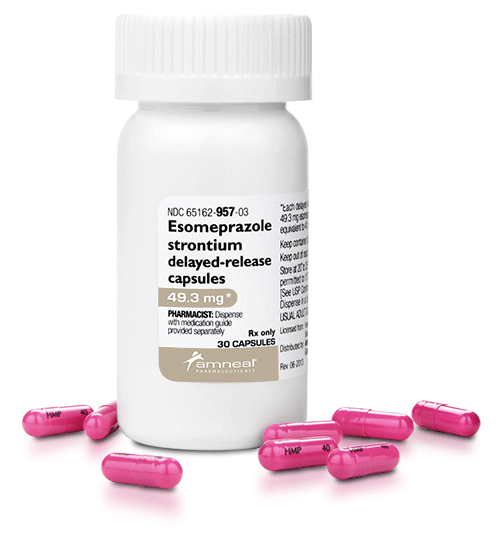
Introducing esomeprazole strontium from Amneal Pharmaceuticals
Esomeprazole therapy is now available as ESOMEPRAZOLE STRONTIUM delayed-release capsules 49.3 mg. This strontium salt is a pharmaceutical alternative with the same indication in adults as Nexium® (esomeprazole magnesium) delayed-release capsules; it is not approved for patients under 18 years old. Esomeprazole strontium provides the same dose of esomeprazole therapy as Nexium® 40 mg* and may likely deliver cost savings to adult patients.
Learn more here.
* Reference: Esomeprazole strontium Full Prescribing Information, section 11
Important Safety Information for Esomeprazole Strontium Delayed-Release Capsules 49.3 mg
Indications and Usage
Esomeprazole strontium is a proton pump inhibitor (PPI) indicated for adults for:
-
Treatment of gastroesophageal reflux disease (GERD)
-
Risk reduction of NSAID-associated gastric ulcer
-
H. pylori eradication to reduce the risk of duodenal ulcer recurrence
-
Pathological hypersecretory conditions, including Zollinger-Ellison syndrome
The safety and effectiveness of esomeprazole strontium have not been established in pediatric patients. Esomeprazole strontium is not recommended for use in pediatric patients.
The safety of esomeprazole strontium has not been studied in patients with severe renal impairment. Esomeprazole strontium is not recommended
for use in patients with severe renal impairment.
Nursing mothers should consider discontinuing esomeprazole strontium.
There are no studies in pregnant women. Esomeprazole strontium should be used during pregnancy only if the potential benefits justify the potential risk to the fetus.
Important Safety Information
Esomeprazole strontium is contraindicated in patients with known hypersensitivity to PPIs. Hypersensitivity reactions, e.g., angioedema and anaphylactic shock have been reported with esomeprazole use.
Symptomatic response to therapy does not preclude the presence of gastric malignancy.
Atrophic gastritis has been noted occasionally in biopsies from patients treated long-term with omeprazole.
Acute interstitial nephritis has been observed in patients taking PPIs.
Cyanocobalamin (vitamin B-12) Deficiency: Daily long-term use (e.g., longer than 3 years) may lead to malabsorption or a deficiency of cyanocobalamin.
PPI therapy may be associated with increased risk of Clostridium difficile associated diarrhea.
Avoid concomitant use of esomeprazole strontium with clopidogrel, because the metabolism of clopidogrel can be impaired. When using esomeprazole strontium consider alternative anti-platelet therapy.
Long-term and multiple daily dose PPI therapy may be associated with an increased risk of osteoporosis-related fractures of the hip, wrist, or spine.
Hypomagnesemia has been reported rarely with prolonged treatment with PPIs. Serious events included tetany, arrhythmias, and seizures, and may require discontinuation of the PPI.
Most common adverse reactions in adults (≥18 years) (incidence ≥1%) are headache, diarrhea, nausea, flatulence, abdominal pain, constipation, and dry mouth.
Avoid concomitant use of esomeprazole strontium with drugs which induce CYP2C19 or CYP3A4, such as with St. John’s Wort or rifampin, due to the potential substantial reduction in esomeprazole levels.
Patients treated with PPIs and warfarin concomitantly may need to be monitored for increases in INR and prothrombin time. Esomeprazole may interfere with the absorption of drugs for which gastric pH affects bioavailability (e.g., ketoconazole, iron salts, and digoxin).
Drug-induced decreases in gastric acidity may increase serum chromogranin A (CgA) levels and may cause false positive results in diagnostic investigations for neuroendocrine tumors. Providers should temporarily stop esomeprazole treatment before assessing CgA levels.
Concomitant use with atazanavir and nelfinavir is not recommended; Concomitant use of saquinavir with PPIs is expected to increase saquinavir concentrations, which may increase toxicity.

